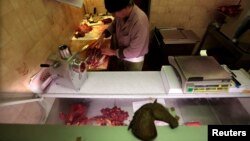Europe's crisis over horsemeat-tainted food products deepened Thursday when British officials said tests showed small quantities of a powerful equine painkiller may have been sold to consumers in France.
The British Food Standards Agency said eight of 206 horses it checked had tested positive for phenylbutazone, commonly known as bute. It said six of the eight, all processed by a southwest English slaughterhouse, were sent to France and "may have entered the food chain."
The agency said it was working with French authorities to trace the meat.
Britain’s chief medical officer said Thursday that the scant levels of the drug found in horsemeat "present a very low risk to human health." She said bute is a commonly used medicine in horses and is also occasionally prescribed to patients suffering from severe arthritis, with serious side effects in rare cases.
In Paris, senior French government officials said an inquiry had revealed the French meat-processing company Spanghero knowingly sold horsemeat as beef. Agriculture Minister Stephane Le Foll said the government may withdraw the firm's operating license.
The scandal has resulted in millions of products being withdrawn from supermarket freezer counters, initially in Britain and Ireland, but also in other countries, including Sweden and Germany.
It has also shed light on the sprawling production chain of the global food industry in countries including Britain, France, Luxembourg and Romania.
The widening crisis began when beef products marketed in several European Union countries were found to contain illicit horsemeat.
Some information for this report was provided by AP and AFP.





